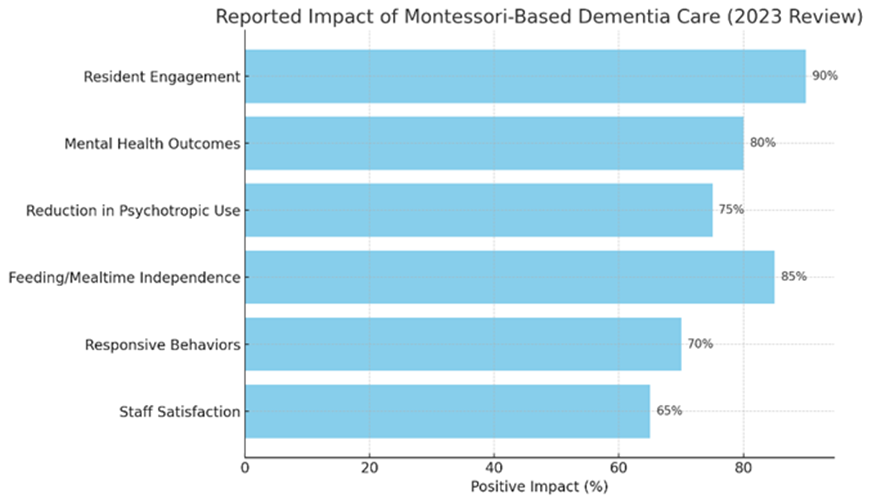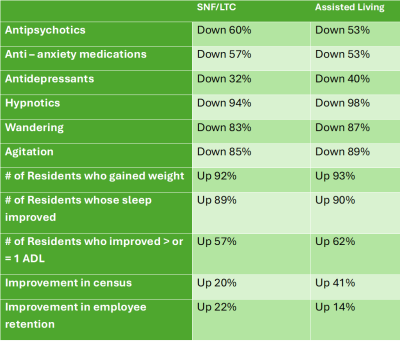
Where the Money Is Made with Montessori Inspired Lifestyle®: The Canadian Business Case You Can’t Ignore
Let’s be direct. Running a long-term care home or retirement residence in Canada is not only about care delivery and compliance.
It is about business survival in an increasingly scrutinized and competitive environment.
Yes, you are already tracking clinical KPIs like falls, hospitalizations, and responsive behaviors. But here’s the truth: those numbers only tell part of the story.
What many leaders overlook are the hidden business costs behind those clinical outcomes: staff turnover, compliance exposure, reputational risk, and occupancy loss.
Montessori Inspired Lifestyle® (MIL) is not a program. It is a system of care and operations that reduces those costs while measurably improving resident experience and staff engagement.
Where Canadian Operators Are Losing Money Today
- Staff Turnover and Burnout
Every resignation costs you thousands in recruitment, onboarding, overtime, and agency staff. Stress, chaos, and constant firefighting drive employees away. Environments grounded in MIL retain staff because the work is less reactive and more meaningful. - Polypharmacy and High Drug Reliance
Provincial drug benefit programs may cover the cost of prescriptions, but heavy drug use drives your costs in other ways: more monitoring, more side effects, more falls, more responsive behaviors, and more compliance scrutiny. Regulators are watching psychotropic use closely. Families equate “too many drugs” with poor care. - Falls and Hospital Transfers
Hospitals are funded publicly — but the cost to you is far from zero. Falls mean incident reports, family meetings, follow-up investigations, extra staffing hours, Ministry inspections, liability risk, and reputational damage. In retirement settings, a fall that sends someone to hospital may mean they never return — a direct loss in occupancy revenue. - Family Dissatisfaction
Dissatisfied families don’t just complain — they undermine your reputation, slow referrals, and weaken occupancy. In today’s marketplace, reputation is a revenue driver. - Regulatory and Legal Risk
Responsive behaviors managed poorly can result in Ministry citations, complaints, and even lawsuits. Each one consumes staff time, damages trust and erodes your credibility as a leader.
Where the Money Is Made with Montessori Inspired Lifestyle®
The ROI of Montessori Inspired Lifestyle® shows up where it matters most:
- Lower Turnover = Lower HR Costs
- Less churn, less overtime, less agency staff.
- Employees stay longer because the work environment is calmer and more rewarding.
- Reduced Drug Reliance = Lower Risk and Workload
- Fewer side effects, fewer responsive behaviors.
- Families and regulators see a culture of engagement, not sedation.
- Fewer Falls = Lower Liability, Higher Stability, and Lower WCB Costs
-
- Less paperwork, fewer investigations, fewer complaints.
- Reduced staff injuries mean lower Workers’ Compensation Board (WCB/WSIB) premiums over time.
- Safer environments boost morale, reduce absenteeism, and stabilize staffing.
- Family Satisfaction = Occupancy Protection
- Families want to see their loved ones living with purpose.
- Higher satisfaction means stronger referrals and a competitive edge.
- Reputation = Market Differentiation
- “Montessori Certified” signals evidence-based quality.
- Easier to market, easier to defend during inspections, easier to attract families.
Training Is the Lever
This is not about slogans. Person-centered care without a system is inconsistent and fragile. Montessori Inspired Lifestyle® provides the framework, training, and tools to make best practices stick.
Without training, staff improvise — and improvisation is expensive. With training, staff are competent, confident, and consistent. That is what drives down turnover, complaints, and risk.

The chart above was created to visually summarize key themes from the 2023 systematic review by Yan et al., published in Dementia (London). The percentages shown reflect the overall strength and consistency of positive outcomes reported across the 15 studies reviewed.
Another study: Researchers tracked the impact of Montessori-based dementia practices across assisted living and skilled nursing facilities. After just one year of implementation, these organizations reported significant improvements in care quality, resident engagement, and staff-reported satisfaction.
As the researchers put it:
“Staff reported that residents were more engaged, calmer, and showed fewer behavioral symptoms. They also noted increased job satisfaction and a renewed sense of purpose in their roles.” ~ Witt-Hoblit, Miller, & Camp (2016), Center for Applied Research in Dementia

The Cost of Doing Nothing
Failing to invest in MIL is not neutral. It is costly.
- You will keep bleeding money through staff turnover.
- You will carry higher compliance and liability risks.
- You will spend thousands of staff hours documenting preventable falls and behaviors.
- Families will choose competitors who can prove engagement, dignity, and rights.
Doing nothing is a business decision — and it is the most expensive one you can make.
The Next Step
Montessori Inspired Lifestyle® is not an add-on. It is a business necessity for Canadian operators. It secures clinical stability, reduces organizational risk, and protects your revenue base.
The organizations that act now will lead the sector. Those that don’t will struggle to keep up — and the gap will only widen.
The decision is yours. Your staff, your families, your residents, and your bottom line will all reflect it.





